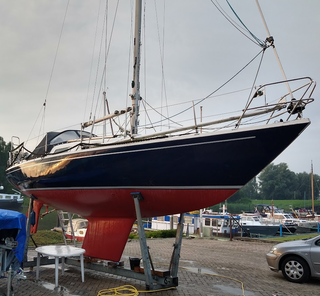Related Research Articles

The M34 is a French sailboat that was designed by Joubert/Nivelt/Mercier as a one-design racer and first built in 2010. The boat was used as the class for the Tour de France à la voile.
The Stratus 36, also called the 107 Stratus for its metric length in decimetres, is a Swedish sailboat that was designed by Peter Norlin as an International Offshore Rule Three-Quarter Ton class racer-cruiser and first built in 1980.

The Ballad 30, also called the Albin Ballad, is a Swedish sailboat that was designed by Rolf Magnusson as an International Offshore Rule (IOR) Half Ton class cruiser-racer and first built in 1971.

The Archambault A13 is a French sailboat that was designed by Joubert Nivelt Design, with Bernard Nivelt as principal designer. It was designed as an IRC racer-cruiser and first built in 2014. The designation indicates the boat's approximate length overall in metres.
The Archambault A27 is a French sailboat that was designed by Joubert Nivelt Design as a racer and first built in 2012.
The Archambault A31 is a French sailboat that was designed by Joubert Nivelt Design as an IRC racer-cruiser and first built in 2009.
Archambault Boats was a French boat builder based in Dangé-Saint-Romain. The company specialized in the design and manufacture of monohull fibreglass sailboats.
The Archambault A35 is a French sailboat that was designed by Joubert Nivelt Design as a racer-cruiser and first built in 2006.
The Archambault A35R and Archambault A35RC are a series of French sailboats that were designed by Joubert Nivelt Design as racer-cruisers and first built in 2014.
The Archambault A40, or Archambault 40, is a French sailboat that was designed by Joubert Nivelt Design as a cruiser-racer and first built in 2004.

The Grand Surprise is a French sailboat that was designed by Joubert Nivelt Design as a racer and first built in 1999.

The Surprise 25, often just called the Surprise, is a French trailerable sailboat, that was designed by Michel Joubert of Joubert Nivelt Design as a one-design racer and first built in 1977.
The Suspens is a French sailboat that was designed by Joubert Nivelt Design as a racer-cruiser and first built in 1979.
The Sprint 95 is a French sailboat that was designed by Joubert Nivelt Design as a racer-cruiser and first built in 1989. The boat's nomenclature indicates its approximate metric length overall in decimetres.
The Contest 25 OC, sometimes called the Contest 25OC, is a Dutch trailerable sailboat that was designed by Jacques De Ridder as a cruiser and first built in 1982.
The Elite 25, also called the Feeling 720 NV, is a French trailerable sailboat that was designed by Michel Joubert of Joubert-Nivelt as a cruiser and first built in 1982.
The Gin Fizz 37 is a French sailboat that was designed by Michel Joubert of the Joubert-Nivelt design firm, as a cruiser and first built in 1974.
The Attalia 32, or just Attalia, is a French sailboat that was designed by the Joubert-Nivelt design firm as a cruiser and first built in 1982.
The Selection 37 is a French sailboat that was designed by the Joubert-Nivelt design firm, as a racer-cruiser specifically for the Tour de France à la voile and first built in 1984.
The Swan 47-2, also called the Swan 47-2 S&S CB and the NYYC 48, is a Finnish sailboat that was designed by Sparkman & Stephens as an offshore cruiser-racer and first built in 1976.
References
- 1 2 3 4 5 6 McArthur, Bruce (2020). "Archambault 40RC sailboat". sailboatdata.com. Archived from the original on 24 December 2020. Retrieved 24 December 2020.
- 1 2 3 4 5 6 7 "A40 RC". Boat-Specs.com. 2020. Archived from the original on 24 December 2020. Retrieved 24 December 2020.
- ↑ McArthur, Bruce (2020). "Joubert-Nivelt". sailboatdata.com. Archived from the original on 19 December 2020. Retrieved 24 December 2020.
- ↑ "Joubert Nivelt Design". Boat-Specs.com. 2020. Archived from the original on 18 December 2020. Retrieved 24 December 2020.
- ↑ Beaufort Marine (2014). "Archambault A40RC". beaufortmarine.asia. Archived from the original on 24 December 2020. Retrieved 24 December 2020.
- 1 2 Heppell, Toby (1 June 2012). "A40RC Review". Yachts & Yachting. Archived from the original on 24 December 2020. Retrieved 24 December 2020.
- ↑ McArthur, Bruce (2020). "Archambault Boats (FRA) 1967 - 2014". sailboatdata.com. Archived from the original on 19 December 2020. Retrieved 24 December 2020.
- ↑ "Archambault". Boat-Specs.com. 2020. Archived from the original on 18 December 2020. Retrieved 18 December 2020.
- ↑ "BG Race". Boat-Specs.com. 2020. Archived from the original on 18 December 2020. Retrieved 18 December 2020.
- 1 2 McCormick, Herb (24 March 2009). "Archambault A40RC". Cruising World. Archived from the original on 14 September 2015. Retrieved 24 December 2020.